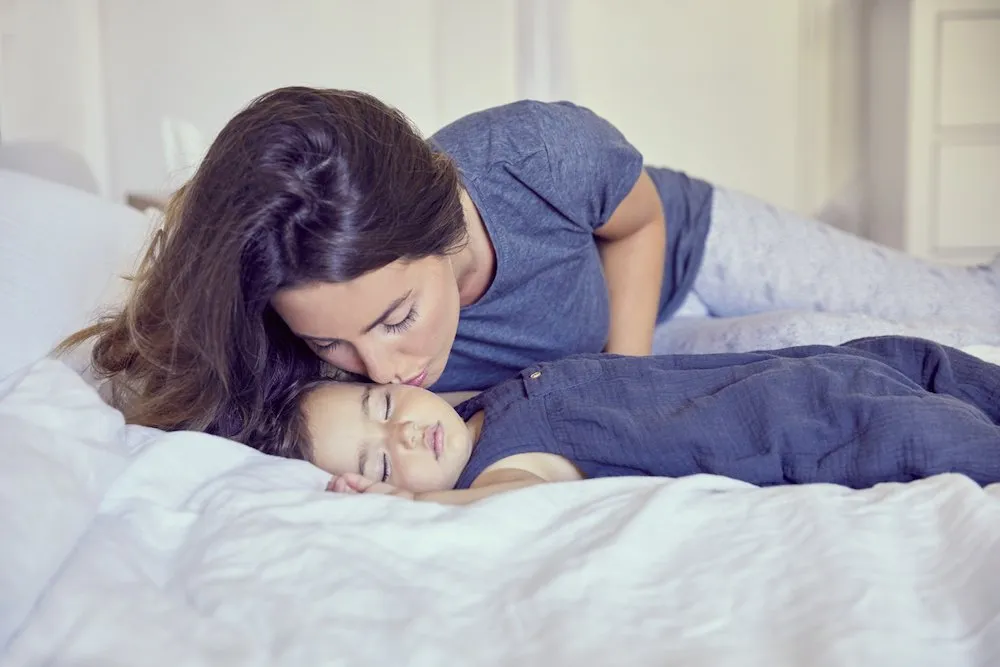Babies frequently have some sleep disturbances following vaccines. Don't worry, parents!
This article will explain why this occurs and how to help baby sleep with calming techniques post-vaccination.
Why won't my baby sleep after vaccines?
If your baby won't sleep after vaccines and is mild fussiness, crying and restless sleep, it is usually due to a sore shot site, but don't worry; it typically peaks within 1-2 days after vaccination.
Following their vaccines, your beautiful little one may be a fussy mess, leaving you perplexed as to why sleep appears to be a thing of the past.
The issue is, it's pretty typical! The purpose of vaccines is to stimulate the immune system, which can have a few temporary side effects.
Discover calming techniques for overtired babies: how to get an overtired baby to sleep
How long do sleep disturbances last after vaccinations?
The good news is that sleep disturbances after vaccinations are usually short-lived. Here's what you can expect:
Most side effects, including sleep disruptions, typically peak within 1-2 days after vaccination.
Within 3-4 days, your baby should return to their usual sleep patterns.
How to help your baby sleep well after vaccines
Your infant may still feel discomfort following their vaccines, no matter how carefully you prepare. To help them feel better and get some slumber, try these calming techniques:
"Consistent routines, self-control and comfort are essential to properly manage the baby's sleep after a vaccine."
💡Dra. Lorena Koppel
It is important that parents remain calm and do not react in an exaggerated or overprotective way, since children need to learn to manage certain moments of tension and get used to them.
Providing a calm environment and following the established routines will help the baby feel safe and sleep better, even after situations that may be uncomfortable or stressful, such as a vaccination.
1. Comfort measures
There's nothing quite like the power of a parent's embrace! Hold your baby close, offer gentle rocking, and speak in a soothing voice. Skin-to-skin contact can also be incredibly calming for babies.
3. Soothing the injection site
After a few hours (so as not to irritate the area further), you can search for our StoryBook app, and there you will find massages, meditations, affirmations, and stories.
After these hours, gently massage the injection site with light touches. This may help reduce pain and discomfort.
🥰 Extra tip: A warm bath can be a relaxing and pain-relieving experience for your baby. The warmth can help soothe sore muscles and promote a sense of calm.
4. White noise
When your baby feels under the weather after vaccinations, creating a calming soundscape can be a powerful tool for promoting relaxation and sleep. White noise is a constant sound that masks other disruptive noises.
How to comfort your baby during shots?
Vaccines are crucial for protecting your baby from serious illnesses. While they're essential, the shots and potential side effects can disrupt your little one's sleep. Here are some tips to help your baby sleep well during and after vaccinations:
Before the appointment
- Schedule during a wake window: Check out our guide to wake windows by age to understand your baby's typical sleep cycles. Aim to schedule the appointment during a wakeful period when your baby is less likely to be exhausted and cranky.
- Dress for comfort: Loose-fitting clothing with easy access to the injection site will make the experience smoother and less disruptive.
- Feeding schedule: Plan your baby's feeding around the appointment to ensure a full tummy beforehand. A satisfied baby is usually a calmer baby.
- Bring familiar items: Pack a favorite stuffed animal, blanket, or pacifier for comfort and security during the appointment.
During the appointment
- Play a soothing audio: A familiar voice can be a calming distraction during the shot. With our Storybook app you can play a soothing audio to help you relax your little one
- Your emotions matter: Babies pick up on your anxiety. Stay calm and positive to help your baby feel secure. Talk to your baby in a soothing voice and offer gentle cuddles.
- Skin-to-skin contact: Consider skin-to-skin contact during the injection. This closeness can provide comfort and reduce pain perception.
- Bring a small, safe toy: A teething toy or rattle can momentarily divert your baby's attention.
- Take your baby's temperature: Some babies may develop a low-grade fever after vaccinations. Monitor their temperature and dress them appropriately to maintain comfort.
Tips for getting your baby back to sleep
Vaccines, while important, can disrupt your baby's usual sleep patterns. Here are some tips to help your little one get back to a restful night's sleep, here baby sleep tips:
Maintain a consistent sleep routine
The secret is routine! Try your best to follow your baby's regular bedtime routine, even if there are some deviations.
For them, this sense of familiarity can be immensely comforting and soothing. This includes feedings, baths, calm snuggles, and (if age-appropriate) bedtime reading.
if you want to see practical and complete examples, this blog will help you: baby sleep schedule
Accept that routine adjustments may be necessary
Although maintaining consistency is crucial, be aware that minor modifications may be required. For instance, you may need to feed your baby or spend more time cuddling with them if they act incredibly fussy. Prioritize your baby's comfort and exercise flexibility.
Ensure a restful sleep environment for your baby
Make sure your baby's sleep environment is conducive to rest. Here are some key elements:
- Darkness: Dim the lights or use blackout curtains to create a dark and calming space.
- Temperature: Keep the room cool, ideally between 68-72°F (20-22°C).
- Noise: Aim for a quiet environment. However, white noise can be helpful for some babies by masking disruptive sounds (see previous section on Soft Music or White Noise).
Make sure your baby stays hydrated
A fever, even a low-grade one, can lead to dehydration. Ensure your baby stays hydrated by offering frequent breastfeeds or formula daily and night.
When to seek professional advice
Call the doctor or seek care now if:
- Fever in baby less than 12 weeks old.
- Fever over 104° F (40° C)
- Fever after vaccine given and weak immune system
- Crying nonstop lasts more than 3 hours
- Rotavirus vaccine followed by vomiting or severe crying
- Your child looks or acts very sick
- You think your child needs to be seen, and the problem is urgent


Written By
Francisco Cornejo, a dynamic entrepreneur with a Masters in Communication from RMIT University in Australia, is the Co-Founder and CEO of Storybook. As a serial entrepreneur, he notably served as the Chief Marketing Officer at Honda Motors in Latin America, shaping the brand's regional presence. Passionate about family well-being and communication, Francisco leads Storybook in its mission to improve children's health globally, aiming to create positive impacts in both corporate and societal spheres.
References
Alsalih, D. A. (2014). The Impact of Vaccination Schedules on Infants' and Children's Physio-Psychological Health. ProQuest OpenView. Retrieved from https://www.proquest.com/openview/8ab566ab84a762bfe067a6d845592fd4/1?pq-origsite=gscholar&cbl=18750








.jpg)